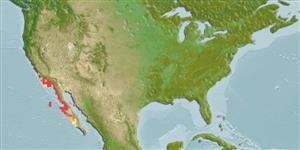>
Blenniiformes (Blennies) >
Clinidae (Clinids)
Etymology: elegans: Gibbonsia in honor of Dr. William P. Gibbons, one of the early naturalists at the California Academy of Sciences; elegans meaning elegant (Ref. 4930).
Environment: milieu / climate zone / depth range / distribution range
Ecología
marino demersal; rango de profundidad ? - 56 m (Ref. 96339), usually ? - 20 m (Ref. 101760). Subtropical; 36°N - 22°N, 121°W - 110°W
Eastern Pacific: Piedras Blancas Point in central California, USA to southern Baja California, Mexico, including Guadalupe Island.
Tamaño / Peso / Age
Maturity: Lm ? range ? - ? cm
Max length : 16.0 cm TL macho / no sexado; (Ref. 2850)
Found from subtidal rocky areas to 56 m depth, usually in seaweed. Female lays white eggs in seaweed, male guards egg mass (Ref. 2850).
Life cycle and mating behavior
Maturities | Reproducción | Spawnings | Egg(s) | Fecundities | Larva
Oviparous (Ref. 101760). Eggs are attached in algal nest and brooded by male parent (Ref. 101760).
Eschmeyer, W.N., E.S. Herald and H. Hammann, 1983. A field guide to Pacific coast fishes of North America. Boston (MA, USA): Houghton Mifflin Company. xii+336 p. (Ref. 2850)
IUCN Red List Status (Ref. 130435)
Threat to humans
Harmless
Human uses
Herramientas
Special reports
Download XML
Fuentes de Internet
Estimates based on models
Preferred temperature (Ref.
123201): 13.2 - 21.6, mean 17.7 °C (based on 12 cells).
Phylogenetic diversity index (Ref.
82804): PD
50 = 0.6250 [Uniqueness, from 0.5 = low to 2.0 = high].
Bayesian length-weight: a=0.00661 (0.00336 - 0.01300), b=3.09 (2.91 - 3.27), in cm total length, based on LWR estimates for this species & (Sub)family-body (Ref.
93245).
Nivel trófico (Ref.
69278): 3.3 ±0.51 se; based on food items.
Resiliencia (Ref.
120179): Alto, población duplicada en un tiempo mínimo inferior a 15 meses (Preliminary K or Fecundity.).
Fishing Vulnerability (Ref.
59153): Low vulnerability (10 of 100).
